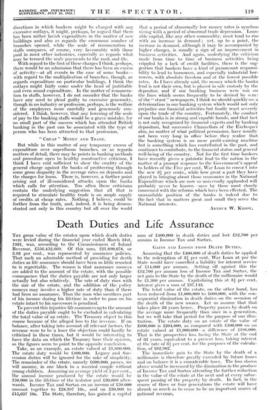" CHEAP " MONEY AND TRADE.
But while in this matter of any temporary excess of expenditure over superfluous branches, or as regards matters of detail, there may be points in banking methods and procedure open to healthy constructive criticism, I think I have said sufficient to show the crudity of the general charge against the banks of profiteering through some gross disparity in the average rates on deposits and the charges for loans. There is, however, a further point arising out of ill-considered attacks upon the banks which calls for attention. Too often these criticisms Contain the underlying suggestion that all that is required to stimulate healthy trade is an ample supply of credits, at cheap rates. Nothing, I believe, could be further from the truth, and, indeed, it is being demon- strated not only in this country but all over the world that a period of abnormally low money rates is synchro- nizing with a period of abnormal trade depression. Loan- able capital, like any other commodity, must tend to rise with an increase in demand ; yet, up to a point, the increase in demand, although it may be accompanied by higher charges, is usually a sign of an improvement in business activities. And again, underlying the criticism made from time to time of business activities being crippled by a lack of credit facilities, there is the sug- gestion that bankers have a kind of paramount responsi- bility to lend to borrowers, and especially industrial bor- rowers, with absolute freedom and at the lowest possible rates. As I have already said, the money which the banks lend is not their own, but is placed in safe custody by the depositor, and if our banking business were run on the lines which seems frequently to be desired by scni-. of the " stunt " newspapers, I think we should quickly see a deterioration in our banking system which would not only prejudice our financial activities but finally react severely upon the trade of the country. Fortunately, the conduct of our banks is in strong and capable hands, and that fact is not only recognized by financial experts and by banking depositors, but successive Chancellors of the Exchequer also, no matter of what political persuasion, have usually not been very, long:in office before they .realize that the banking system is no mere profit-earning machine but is something which has contributed in the past, and continues to contribute, to the financial status and general well-being of the country. Not for. the first time bankers have recently given 11.-- patriotic lead to the nation in the matter of a prompt response to the Government's appeal to holders of the Five per cent. War Loan to convert into the new 31 per cents., while how great a part they have played in bringing about those economies in the National Expenditure which are now so universally applauded will probably never be known—save by those most closely concerned with the reforms which have been effected. The unassailable position of the banks is indeed due to the fact that in matters great and small they serve the National interests.
ARTHUR W. KIDDY.














































 Previous page
Previous page